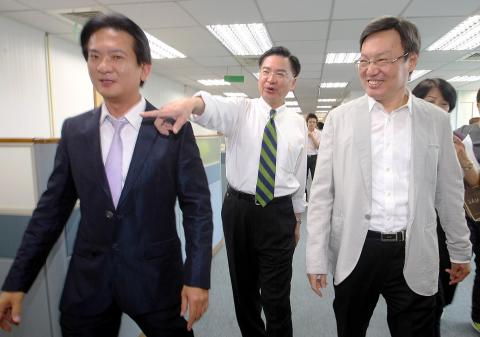The so-called “1992 consensus” has been abandoned by both the Chinese Nationalist Party (KMT) and Beijing, as both are now adhering to the “one China” framework (一中框架), members of the Democratic Progressive Party (DPP) told a forum yesterday.
The closed-door meeting on how the party should deal with the “1992 consensus,” which was widely considered the primary reason behind its loss in the presidential election last year, was the second of nine scheduled forums on major China policy issues the DPP has arranged.
The DPP has never recognized the existence of such a consensus. While both the KMT and the Chinese Communist Party (CCP) recognized the initiative, they defined it differently, with the KMT interpreting it as “one China, with different interpretations” (一中各表), while Beijing saw the consensus as “a pledge to express each other’s insistence on the ‘one China’ principle.”

Photo: CNA
Most participants in the forum held the same view as the DPP’s official position and tended to agree that the “1992 consensus” has become a non-issue in the face of recent developments, DPP China Affairs Committee spokesperson Cheng Wen-tsang (鄭文燦) told a post-forum press briefing.
In recent KMT-CCP meetings, the KMT has echoed Beijing’s “one China” framework of “one country, two regions,” and reaffirmed their anti-Taiwan independence position, Cheng quoted DPP politicians as saying.
Meanwhile, the KMT no longer promotes its “one China, with different interpretations” stance and President Ma Ying-jeou’s (馬英九) interpretation of the consensus in his latest message to Chinese President Xi Jinping (習近平) has been tilting toward Beijing’s definition, Cheng summed up several participants’ remarks as saying.
“The KMT and the CCP handled the issue [by giving it up] before we were able to handle it,” Cheng said.
However, a different voice from an unusual participant, former National Security Council (NSC) secretary-general Su Chi (蘇起), raised participants’ eyebrows and attention.
Su has admitted he coined the term in April 2000 as an outgoing official of the then-KMT administration for the purpose of facilitating communication and reconciliation between the CCP and the DPP, which was set to take power in May that year.
He has said the consensus was more of a political term and a symbol than a substantial ideology, but it was able to build mutual trust between the KMT and the CCP.
The Ma confidant yesterday advised the DPP to work on building trust with Beijing and try to seek a party consensus on “no independence,” since Taiwanese independence “is now an unrealizable goal for most people.”
“[Taiwan independence] could stay on as an ideal, but the DPP perhaps has to give it up as a policy option,” he said after the forum.
Academia Sinica political scientist Hsu Szu-chien (徐斯儉) argued about the necessity for Taiwan, a “small yet respectable democracy,” to trust the authoritarian regime of Beijing, saying that the key issue was not which party wins Beijing’s trust, but how Taiwan would face a much bigger neighbor with territorial claims and military threats against it as a country, Cheng said.
“Why does Beijing have to be the final judge on Taiwan’s political aspiration and hold the right to set the timetable?” Cheng quoted Hsu as saying.
Separately yesterday, KMT spokesman Yin Wei (殷瑋) defended the “1992 consensus” as the party’s unchanged cross-strait policy, and questioned the DPP over its intention to redefine its cross-strait policy.
“The DPP is looking to find a practicable path on cross-strait policy, but it seems that it is unable to come up with a persuasive consensus in defining cross-strait relations,” he said.
Additional reporting by Mo Yan-chih

Taiwan is stepping up plans to create self-sufficient supply chains for combat drones and increase foreign orders from the US to counter China’s numerical superiority, a defense official said on Saturday. Commenting on condition of anonymity, the official said the nation’s armed forces are in agreement with US Admiral Samuel Paparo’s assessment that Taiwan’s military must be prepared to turn the nation’s waters into a “hellscape” for the Chinese People’s Liberation Army (PLA). Paparo, the commander of the US Indo-Pacific Command, reiterated the concept during a Congressional hearing in Washington on Wednesday. He first coined the term in a security conference last

Prosecutors today declined to say who was questioned regarding alleged forgery on petitions to recall Democratic Progressive Party (DPP) legislators, after Chinese-language media earlier reported that members of the Chinese Nationalist Party (KMT) Youth League were brought in for questioning. The Ministry of Justice Investigation Bureau confirmed that two people had been questioned, but did not disclose any further information about the ongoing investigation. KMT Youth League members Lee Hsiao-liang (李孝亮) and Liu Szu-yin (劉思吟) — who are leading the effort to recall DPP caucus chief executive Rosalia Wu (吳思瑤) and Legislator Wu Pei-yi (吳沛憶) — both posted on Facebook saying: “I

A court has approved Kaohsiung prosecutors’ request that two people working for Democratic Progressive Party (DPP) Legislator Lin Dai-hua (林岱樺) be detained, as a probe into two cases allegedly involving her continues. The request was made on Friday, after prosecutors raided Lin’s two offices and the staffers’ residences, and questioned five on suspicion of contravening the Anti-Corruption Act (貪汙治罪條例). The people included the directors of Lin’s Daliao (大寮) and Linyuan (林園) district offices in Kaohsiung, surnamed Chou (周) and Lin (林) respectively, as well as three other staffers. The prosecutors’ move came after they interrogated Lin Dai-hua on Wednesday. She appeared solemn following

Sung Chien-liang (宋建樑), who led efforts to recall Democratic Progressive Party (DPP) Legislator Lee Kun-cheng (李坤城), was released on bail of NT$80,000 today amid outcry over his decision to wear a Nazi armband to questioning the night before. Sung arrived at the New Taipei District Prosecutors’ Office for questioning in a recall petition forgery case last night wearing a red armband bearing a swastika, carrying a copy of Adolf Hitler’s Mein Kampf and giving a Nazi salute. Sung left the building at 1:15am without the armband and covering the book with his coat. Lee said today that this is a serious